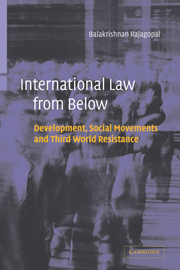Book contents
- Frontmatter
- Contents
- Abbreviations
- Preface and Acknowledgments
- Introduction
- PART I International law, development, and Third World resistance
- PART II International law, Third World resistance, and the institutionalization of development: the invention of the apparatus
- PART III Decolonizing resistance: human rights and the challenge of social movements
- 7 Human rights and the Third World: constituting the discourse of resistance
- 8 Recoding resistance: social movements and the challenge to international law
- 9 Markets, gender and identity: a case study of the Working Women's Forum as a social movement
- PART IV Epilogue
- References
- Index
8 - Recoding resistance: social movements and the challenge to international law
from PART III - Decolonizing resistance: human rights and the challenge of social movements
Published online by Cambridge University Press: 09 July 2009
- Frontmatter
- Contents
- Abbreviations
- Preface and Acknowledgments
- Introduction
- PART I International law, development, and Third World resistance
- PART II International law, Third World resistance, and the institutionalization of development: the invention of the apparatus
- PART III Decolonizing resistance: human rights and the challenge of social movements
- 7 Human rights and the Third World: constituting the discourse of resistance
- 8 Recoding resistance: social movements and the challenge to international law
- 9 Markets, gender and identity: a case study of the Working Women's Forum as a social movement
- PART IV Epilogue
- References
- Index
Summary
A focus on social movements with restructuring agendas itself incorporates a political judgment on how drastic global reform can best be achieved at this stage of history.
Lawyers generally do not concern themselves with mass politics or popular resistance. By professional training, intellectual orientation, political and class alignment, and tradition, lawyers focus on institutions of various kinds, whether governmental or private. As such, they tend to ask different sets of questions about social change and the role of law in it. For instance, in domestic law, they examine the ‘contribution’ of courts to the civil rights movement in the US by studying landmark cases such as Brown v. Board of Education. Such ‘technical’ or ‘legal’ discussions result in distilling the contribution of the masses out of historical transformations, and they highlight only the role played by judges and lawyers. In this rather clinical reduction of facts, the ‘case’ becomes the historical event itself, so that legal history is reduced to a cataloguing of factually abstracted episodes that bear little relation to each other.
This tendency in western domestic law to ignore the contribution of the masses has been subjected to criticism from at least two directions in recent years. First, in the US, an assortment of critical race theorists, feminists, gay-lesbian-queer theorists, have subjected this decontextualized, technocratic-rational model of law and legal history to criticism on the grounds that it ignores the role that law plays in everyday life and empowerment and also the role played by ordinary people as agents of legal transformation.
- Type
- Chapter
- Information
- International Law from BelowDevelopment, Social Movements and Third World Resistance, pp. 233 - 271Publisher: Cambridge University PressPrint publication year: 2003
- 1
- Cited by



